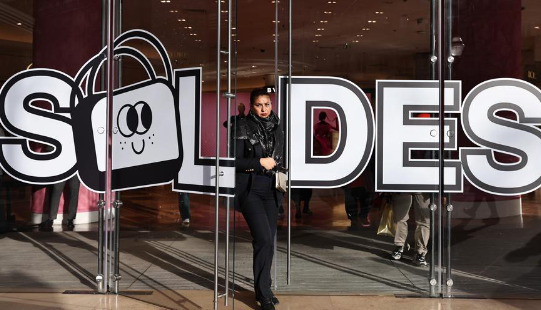U.S. tariffs squeeze European high-end manufacturers, dimming industry prospects

A customer walks out of the Galeries Lafayette Haussmann department store with winter sales signs on its gates in Paris, France, Jan. 10, 2025 (Xinhua/Gao Jing)
Luxury groups face a difficult balancing act: holding prices may squeeze profits while increasing them risks losing the next generation of buyers.
Europe's flagship luxury and high-end manufacturing sectors, from French leather goods and Swiss watches to German premium cars, are under growing pressure from U.S. tariffs on European exports.
Once seen as pillars of "Made in Europe," these industries now face falling profits and declining market confidence. Analysts warn that prolonged tariff tensions could reshape production strategies, cost jobs and weaken Europe's cultural influence rooted in craftsmanship.
PROFIT SQUEEZE
The world's largest luxury goods group, LVMH, said revenue from its core fashion and leather goods division reached 27.6 billion euros (32.02 billion U.S. dollars) in the first three quarters, down about 8 percent from a year earlier. Executives said the U.S. market remains challenging and that uncertainty over tariffs is weighing on demand.
French rival Kering fared even worse, with group sales down about 12 percent to 11 billion euros (12.76 billion dollars). Its flagship brand Gucci saw a plunge of 22 percent year-on-year in revenue.
The downturn has spread beyond fashion. Porsche's automotive operating profit slumped nearly 99 percent, down from 4.04 billion euros (4.69 billion dollars) to 40 million euros (46.4 million dollars). Jochen Breckner, the company's finance and IT chief, said U.S. tariffs could cost the carmaker around 700 million euros (812 million dollars) in 2025.
Switzerland's watch industry, a cornerstone of European craftsmanship, has also suffered. Since August, the United States has imposed a 39 percent tariff on Swiss watches and related goods, sending September exports to the U.S. down 56 percent year-on-year.
Nick Hayek, CEO of Swatch Group, owner of Omega and Breguet, described the added cost burden as unsustainable, noting that production in Switzerland is already expensive. Tariffs approaching 40 percent make it impossible to absorb the additional cost.
DEMAND WEAKENS
While raising prices may temporarily protect margins, economists caution that overreliance on price adjustments could damage brand loyalty and alienate younger consumers. Luxury groups face a difficult balancing act: holding prices may squeeze profits while increasing them risks losing the next generation of buyers.
The United States accounts for more than 23 percent of global personal luxury spending, according to consulting firm Bain & Company. But European brands' decision to pass tariff costs to consumers is cooling demand in what was once their most profitable market.
Porsche said it will raise prices for its U.S. lineup in the coming months, while Swatch plans to lift prices by 5-15 percent. Analysts expect U.S. luxury consumption to contract this year as shoppers become more cautious.
According to the Boston Consulting Group, the combined pressures of tariffs and a slowing economy are prompting American consumers to scale back luxury purchases. High-end spending is especially sensitive to confidence, which tends to fall quickly in periods of economic or policy uncertainty.
Industry consultants noted that middle-class consumers who once saved for entry-level luxury items, such as handbags, are now delaying purchases. This shift in buying behavior could indicate a broader cooling of the luxury market, potentially weighing on sales growth for European brands in the United States and beyond.
PRODUCTION LIMITS
Some European companies have explored shifting production to the United States to bypass tariffs, but results so far have been mixed. Reuters reported that Louis Vuitton's Texas factory, opened in 2019, has faced low productivity and a shortage of skilled workers.
Porsche has ruled out building cars in the United States, citing limited export volumes and the complexity of its production lines.
Industry analysts warned that relocating production would also challenge the essence of luxury branding, which relies on authenticity rooted in European craftsmanship. Such a move could weaken the qualities that make these brands highly valued worldwide.
Kering executives have emphasized that their products are made in Italy and France to reflect European culture, and producing them in the United States would undermine that heritage.
As Europe's high-end manufacturers navigate this dilemma, the global luxury market faces growing uncertainty. For an industry built on heritage, scarcity and emotional appeal, adapting to a world of tariffs and protectionism could prove a significant test of resilience.
Editor:伏娅敏
